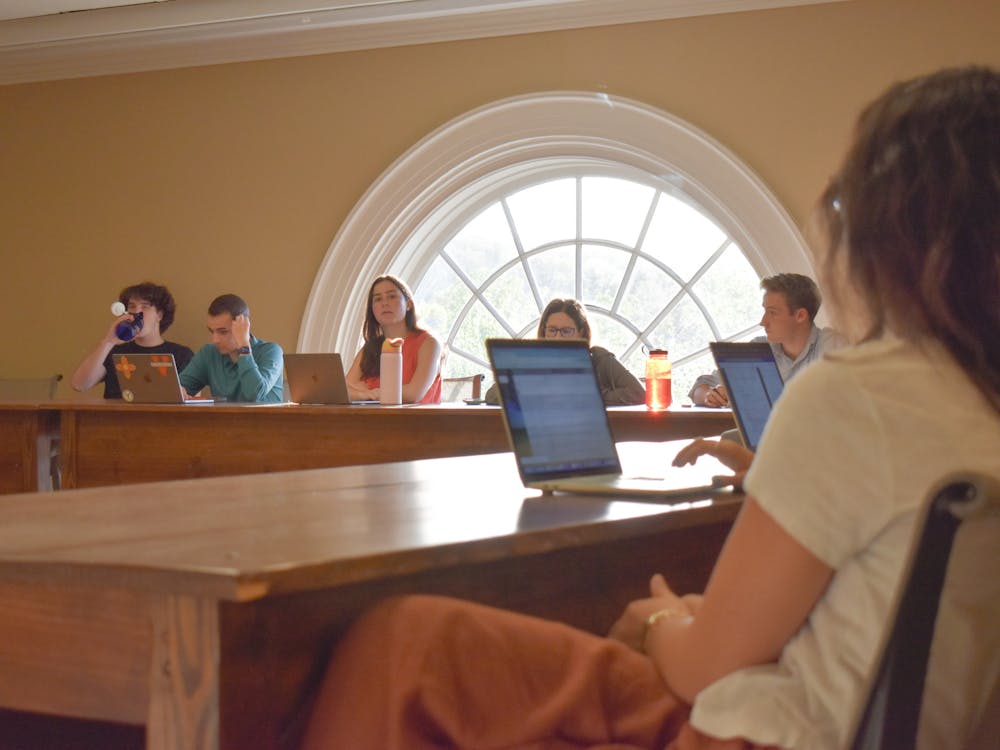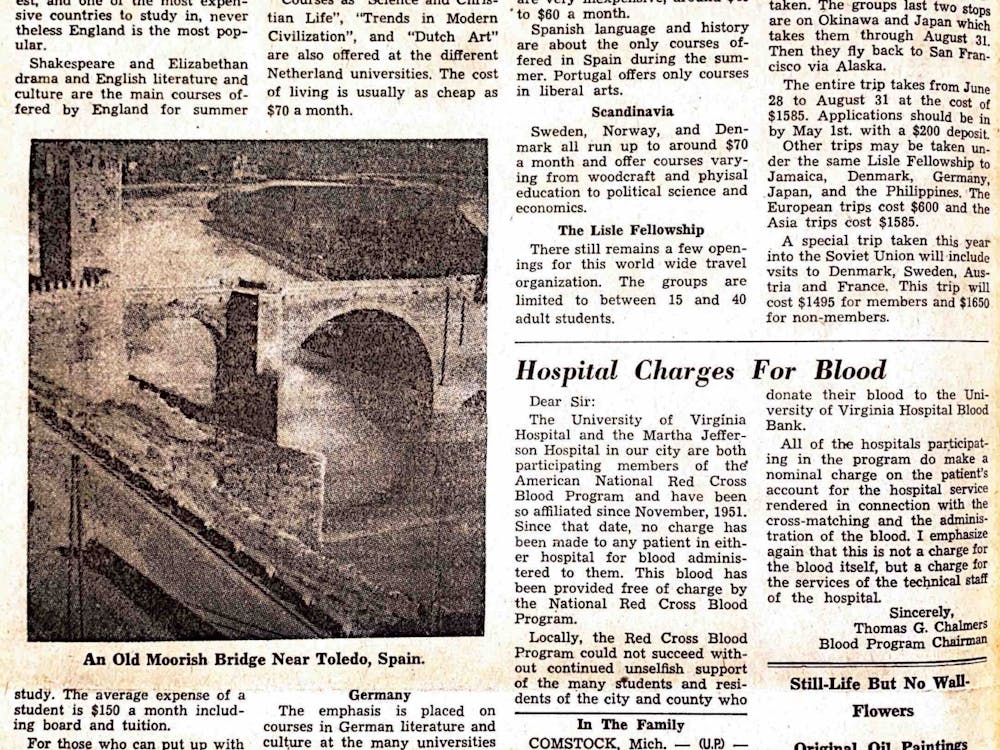The University offers 19 languages in the College — everything from Arabic to Urdu — as part of a robust foreign language requirement, which calls on all College students, with the exception of Echols Scholars, to complete as many as 14 foreign language credits.
Each language department approaches the competency requirement differently, however. Where some departments emphasize immediately teaching in the target language — conducting the entire course in the language within the first semester — many others focus on developing grammar before speaking.
Meeting the requirement
Students have to complete through — or earn exemption through testing from — the 2020 level in a target language.
“Each level requires another level of proficiency,” French Department Chair Prof. Ari Blatt said. “There’s no exit exam, but they need to get a passing grade in 2020.”
Blatt noted some universities require students to successfully pass a “proficiency interview” in order to fulfill the language requirement. Blatt previously administered proficiency interviews at another university.
“There’s been some talk of that,” Blatt said. “I thought it was fun to administer. I think the students felt a sense of accomplishment afterward.”
There are currently no plans to initiate a language proficiency interview in the University’s French Department.
“Nobody’s expecting that by the time a student finished 2020 or even a French major that they’re going to be speaking or writing like someone with native French,” Blatt said. “But the idea is to get them as close to that as we can.”
Language in the classroom
Each foreign language department upholds four pillars of language: writing, reading, oral comprehension and speaking. No department explicitly prioritizes one skill above the others, but instructors emphasize the importance of exposing students to relevant language as early and as often as possible.
Modern Hebrew Program Coordinator Zvi Gilboa said students must practice speaking skills right away in order to attain fluency.
“Learning a foreign language is a very long process,” Gilboa said. “I put an emphasis on students being able to be fully functional, regardless of the shortcomings of their skills or vocabulary at any point.”
This technique of immersion is a fairly new approach to language acquisition.
“It used to be that you could learn, learn, learn and then you have learned everything you need to know,” Gilboa said. “The approach that I take is that you actually have to jump into the water from the very first moment and realize that the gap between you and where you want to be is gradually going to become smaller.”
Gilboa encourages his students to practice their speaking skills at all levels, even if they feel discomfort or uncertainty with learning a language.
“As a speaker of a foreign language, a lot of your ability and competence depends on your ability to hide your inabilities,” Gilboa said. “You have to participate even when you don’t exactly understand everything that’s being said to you. That is the true art of learning a foreign language, of operating in a foreign language, and also teaching in a foreign language. It’s faking it all the time until you no longer need to fake it.”
Second-year College student Zak Krooks is a student in Gilboa’s Intermediate Modern Hebrew course. Krooks noted a concerted effort to develop all aspects of his language skills.
“I think that Zvi attempts to really give a complete teaching,” Krooks said. “We do try to do as much writing as speaking. In class it’s more speaking, but at home it’s more writing, so it really rounds itself out.”
Though Krooks said he has noticed an improvement in his Hebrew skills, he would not feel comfortable conversing with a native Hebrew speaker at this juncture.
“I definitely can say that [the Hebrew department is] doing a great job,” Krooks said. “I didn’t know any Hebrew beforehand, and now I am much more confident in my abilities. Every day I see an improvement.”
Each language poses its own unique challenges. For example, faculty members of the Department of Slavic Languages and Literatures said it is often difficult for students to speak Slavic languages until later on in their course of study because even simple sentences require multiple cases and it takes several semesters to completely introduce each grammatical case.
Maria Ivanova, a lecturer in the Department of Slavic Language and Literature, teaches first-year Polish as well as second- and fourth-year Russian.
Ivanova noted that particularly in Slavic languages, it is very difficult for students to learn basic concepts without using a fair amount of English.
“Even in the beginning levels I try to use as much of the language as possible,” Ivanova said. “I will use the words that they might not necessarily understand but can figure out with context. I try to expose them to the language as much as I can without scaring them.”
Ivanova said students often experience a boost in confidence once they master basic grammatical concepts.
Lilia Travisano, associate professor of Russian and coordinator of the Russian Language Program, agreed.
“I tell students that Russian is an exceptional language, because almost every single grammar rule has tons of exceptions,” Travisano said. “It’s the kind of language that we don’t expect conversation right away. … It’s slower than other languages.”
Third-year College student Ben Gorman is a student in Travisano’s first-year Russian course. He has only been studying Russian for about three weeks.
“You really just have to practice every night and keep up with it,” Gorman said.
Beyond the requirement
The language departments at the University offer various programs to enrich the study of language, which many students choose to take advantage of.
For example, the German department has recently introduced a content-focused seminar on modern German history as an alternative to the traditional Intermediate German course.
Manuela Achilles, associate director for the University Center for German Studies, teaches the course.
“We’re doing everything that a textbook would do, but we are looking at historical topics and drawing on authentic materials,” Achilles said. “It’s a class that tries to add an experiential level to learning.”
Achilles said she believes the inclusion of a theme adds an element of interest to the course.
“It helps that you have a more concrete experience so that you can build vocabulary around the theme,” Achilles said.
Third-year College student Ravynn Stringfield dedicates herself to applying her foreign language skills outside of the classroom while living in the Maison Française, the University-owned French House.
Stringfield said in Maison Française, faculty advisors allow her to practice her language skills on a regular basis.
“It’s definitely intimidating, but I feel comfortable holding my own with a native speaker,” Stringfield said. “They usually understand that no matter how long you’ve been taking it, it’s not your first language.”
The University also offers a wide variety of study abroad programs which can help students develop their language skills. Students can choose to study abroad during the school year, during January Term, or during the summer in locations such as Delhi, Dublin, Lyon, Rabat, Valencia and many more.
Ivanova noted the benefits of studying abroad in developing language skills.
“Lots of students gain confidence when they study abroad, and after they return they really see how their grammar can work,” Ivanova said. “Everyone starts speaking significantly more confidently if they go abroad and they are immersed in the language.”
Creating a global community
Blatt said studying other languages and cultures is especially important in today’s increasingly globalized world.
“Learning a second language is useful for your brain,” Blatt said. “It exercises your brain that learning something else is not going to do. Knowing something about another culture and knowing their values and history.”
Blatt and the French Department are attempting to provide students with a curriculum which acknowledges and embraces globalization.
“We changed our name recently; we’re no longer the Department of French Language and Literature, we’re the Department of French,” Blatt said. “We do language to be sure, but we also do literature, we teach about North Africa, we teach about the Caribbean, we teach about other Francophone countries. There’s a lot more that goes into it, and I think the language is really important, but getting to know the world — getting out of the “America-Box” that a lot of students get into in college — is really useful.”
Fourth-year College student Dylan Herrmann chose to continue his study of French past the language requirement by becoming a French major.
“It’s less about the requirements of the language in terms of the brick and mortar of it,” Herrmann said. “What it should be about is the growing importance of a [second] language worldwide.”
A 2002 study found that college graduates who spoke a second language had on average salaries 2 percent greater than monolingual graduates.
Everette Fortner, executive director for professional development and adjunct faculty member at the Darden School, confirmed the growing importance of familiarizing oneself other cultures.
“More and more job opportunities have an international component, whether you are traveling internationally, or just dealing with suppliers, customers, or other divisions of your company,” Fortner said. “I think what’s more important is that students can demonstrate that they can deal with a diverse set of people from different cultures, rather than being able to speak a different language.”




